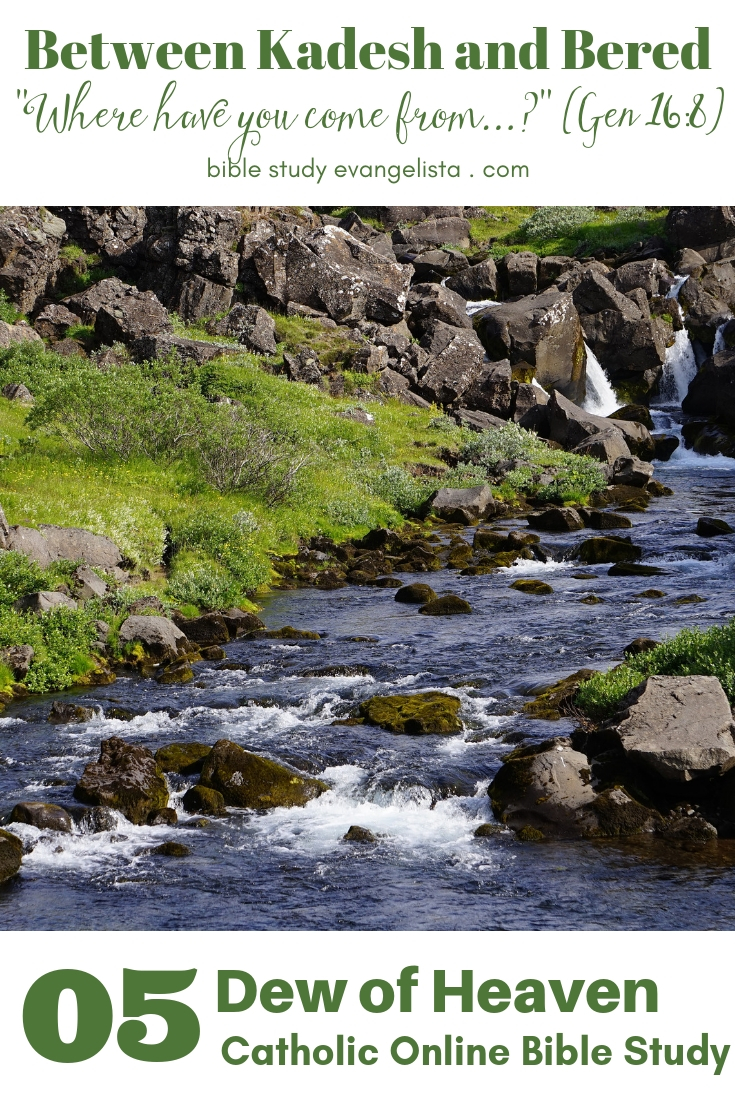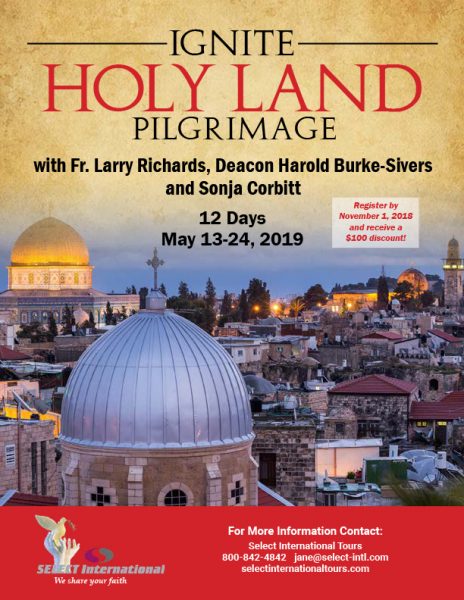Bible Study Evangelista - Between Kadesh and Bered

“IN this unpretending chapter we have laid bare to us the origin of one of the most striking facts in the history of religion: namely, that from the one person of Abram have sprung Christianity and that religion which has been and still is its most formidable rival and enemy, Mohammedanism.
“To Ishmael, the son of Abram, the Arab tribes are proud to trace their pedigree. Through him they claim Abram as their father, and affirm that they are his truest representatives, the sons of his first-born. In Mohammed, the Arabian, they see the fulfilment of the blessing of Abram, and they have succeeded in persuading a large part of the world to believe along with them.
“Little did Sarah think when she persuaded Abram to take Hagar that she was originating a rivalry which has run with keenest animosity through all ages and which oceans of blood have not quenched. The domestic rivalry and petty womanish spites and resentments so candidly depicted in this chapter, have actually thrown on the world from that day to this one of its darkest and least hopeful shadows. The blood of our own countrymen, it may be of our own kindred, will yet flow in this unappeasable quarrel. So great a matter does a little fire kindle. So lasting and disastrous are the issues of even slight divergences from pure simplicity” (Expositor’s Bible).
LOVE the Word® is a Bible study method based on Mary’s own practice: lectio without the Latin.
L – Listen (Receive the Word.)
O – Observe (Choose one or more of the following personality approaches to connect the passage to your life and recent events.)
F | Franciscan – Not speaking about danger, here, merely petty injustice, but what unjust situation have you run away from that God wants you to return to? Have you considered that your submission may include a promise, along with punishment for the one who acted unjustly?
I | Ignatian – Using all your senses, spend some time imagining Hagar’s situation and circumstances from the time Sarah gave her to Abram, through her conversation with the Angel of the Lord, and her return back to their home. What do you see, hear, feel, smell, touch, taste as you begin traveling back to Egypt, your homeland; receive refreshment by the spring; and attempt to gather the guts to go back and submit to Sarah? What happens when you get back?
A | Augustinian – Are you living fully in God’s will? How do you know? Have you asked Him?
T | Thomistic – What do you learn from the following Bible encyclopedia entry?
Kadesh-Barnea
kā´desh-bar´nḗ-a (קדשׁ בּרנע, ḳādhēsh barnēa‛; Καδής, Kadḗs): Mentioned 10 times; called also “Kadesh” simply. The name perhaps means “the holy place of the desert of wandering.” There are references to Kadesh in early history. At En-mishpat (“the same is Kadesh”) Chedorlaomer and his allies smote the Amalekite and Amorite. Abraham dwelt near Kadesh, and it was at Beer-lahai-roi between Kadesh and Bered that the Angel of Yahweh appeared to Hagar (Gen_14:7; Gen_16:14; Gen_20:1). It was an important camp of the Israelites during their wanderings, and seems to have been their headquarters for 38 years (Deu_1:2; Deu_2:14; Judith 5:14). There the returning spies found the camp (Num_13:26); there Miriam died and was buried (Num_20:1); from thence messengers were sent to the king of Edom (Num_20:14; Jdg_11:16 ff). There the people rebelled because of the want of water, and Moses brought water from the rock (Num_20:2 ff); it was called therefore Meribath – or Meriboth-Kadesh (Num_27:14; Eze_47:19; Eze_48:28). It was situated in the wilderness of Zin (Num_20:1; Num_33:36, Num_33:37) in the hill country of the Amorites (Deu_1:19), 11 days’ journey from Horeb, by the way of Mt. Seir (Deu_1:2), “in the uttermost” of the border of Edom (Num_20:16), and on the southern border, probably the Southeast corner, of Judah (Eze_47:19; compare Judith 19). See Cobern, Homiletic Review, April and May, 1914.
kā´desh-bar´nḗ-a (קדשׁ בּרנע, ḳādhēsh barnēa‛; Καδής, Kadḗs): Mentioned 10 times; called also “Kadesh” simply. The name perhaps means “the holy place of the desert of wandering.” There are references to Kadesh in early history. At En-mishpat (“the same is Kadesh”) Chedorlaomer and his allies smote the Amalekite and Amorite. Abraham dwelt near Kadesh, and it was at Beer-lahai-roi between Kadesh and Bered that the Angel of Yahweh appeared to Hagar (Gen_14:7; Gen_16:14; Gen_20:1). It was an important camp of the Israelites during their wanderings, and seems to have been their headquarters for 38 years (Deu_1:2; Deu_2:14; Judith 5:14). There the returning spies found the camp (Num_13:26); there Miriam died and was buried (Num_20:1); from thence messengers were sent to the king of Edom (Num_20:14; Jdg_11:16 ff). There the people rebelled because of the want of water, and Moses brought water from the rock (Num_20:2 ff); it was called therefore Meribath – or Meriboth-Kadesh (Num_27:14; Eze_47:19; Eze_48:28). It was situated in the wilderness of Zin (Num_20:1; Num_33:36, Num_33:37) in the hill country of the Amorites (Deu_1:19), 11 days’ journey from Horeb, by the way of Mt. Seir (Deu_1:2), “in the uttermost” of the border of Edom (Num_20:16), and on the southern border, probably the Southeast corner, of Judah (Eze_47:19; compare Judith 19). See Cobern, Homiletic Review, April and May, 1914.
V – Verbalize (Pray about your thoughts and emotions.)
Remembering that He loves you and that you are in His presence, talk to God about the particulars of your O – Observe step. You may want to write your reflections in your LOVE the Word® journal. Or, get a free journal page and guide in the right-hand margin.
E – Entrust (May it be done to me according to your word!)
“My Lord God, I have no idea where I am going. I do not see the road ahead of me. I cannot know for certain where it will end. Nor do I really know myself, and the fact that I think that I am following your will does not mean that I am actually doing so. But I believe that the desire to please you does in fact please you. And I hope I have that desire in all that I am doing. I hope that I will never do anything apart from that desire. And I know that if I do this you will lead me by the right road, though I may know nothing about it. Therefore will I trust you always, though I may seem to be lost and in the shadow of death. I will not fear, for you are ever with me, and you will never leave me to face my perils alone” (Thomas, Merton, Thoughts on Solitude).
.
.
*LOVE the Word® exercises are offered according to FIAT: the four personalities, or “prayer forms,” explored in Prayer and Temperament, by Chester Michael and Marie Norrisey: Franciscan, Ignatian, Augustinian, and Thomistic: FIAT! These prayer forms correspond to the Myers-Briggs personality types.
Pray for Us
The pilgrimage is full. Plan to go next year!
Share the LOVE
Read the Transcript
You can download a complete, word-for-word transcript here, when it becomes available, courtesy of Dora Donovan who does our transcripts for you.


Comments
Post a Comment